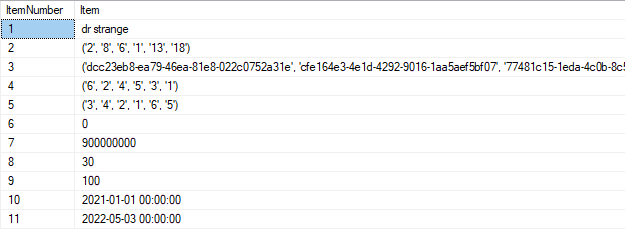Need help to split string, and access the array
-
Hi,
I've have this kind of string,
dr strange~('2', '8', '6', '1', '13', '18')~('dcc23eb8-ea79-46ea-81e8-022c0752a31e', 'cfe164e3-4e1d-4292-9016-1aa5aef5bf07', '77481c15-1eda-4c0b-8c5c-168479b3c7cf', 'f39f33c7-09de-4bb4-9f07-ea93d04fdb47', '719707f8-8931-4e25-ac15-28c55284af1a', '733fe23b-d053-4d54-bb96-fe03573cf79d', '4ffb80d8-3c1a-4dcc-a3d6-f44865105123', 'c0b35951-5ecf-4fe2-85d4-580051caf1f5', '1dc4a64a-6859-4f98-be87-8e6507b4dc42', '4150771f-8dee-45b2-8661-c9890e94d2f1', '1850dd6e-2e03-49da-b0b4-e16ed24f371d')~('6', '2', '4', '5', '3', '1')~('3', '4', '2', '1', '6', '5')~0~900000000~30~100~2021-01-01 00:00:00~2022-05-03 00:00:00The separator is ~ . It is tilde
How to split and access the array[0] ?
Please help
-
Arrays do not exist in SQL Server, But strings can still be split and referenced by their ordinal ('ItemNumber' in the following).
This code relies on the existence of the legendary DelimitedSplit8K function – code and thorough explanation can be found here.
DECLARE @x VARCHAR(8000);
SET @x
= 'dr strange~(''2'', ''8'', ''6'', ''1'', ''13'', ''18'')~(''dcc23eb8-ea79-46ea-81e8-022c0752a31e'', ''cfe164e3-4e1d-4292-9016-1aa5aef5bf07'', ''77481c15-1eda-4c0b-8c5c-168479b3c7cf'', ''f39f33c7-09de-4bb4-9f07-ea93d04fdb47'', ''719707f8-8931-4e25-ac15-28c55284af1a'', ''733fe23b-d053-4d54-bb96-fe03573cf79d'', ''4ffb80d8-3c1a-4dcc-a3d6-f44865105123'', ''c0b35951-5ecf-4fe2-85d4-580051caf1f5'', ''1dc4a64a-6859-4f98-be87-8e6507b4dc42'', ''4150771f-8dee-45b2-8661-c9890e94d2f1'', ''1850dd6e-2e03-49da-b0b4-e16ed24f371d'')~(''6'', ''2'', ''4'', ''5'', ''3'', ''1'')~(''3'', ''4'', ''2'', ''1'', ''6'', ''5'')~0~900000000~30~100~2021-01-01 00:00:00~2022-05-03 00:00:00';
SELECT split.ItemNumber
,split.Item
FROM dbo.DelimitedSplit8K(@x, '~') split;Results are as follows:

Viewing 2 posts - 1 through 2 (of 2 total)
You must be logged in to reply to this topic. Login to reply
